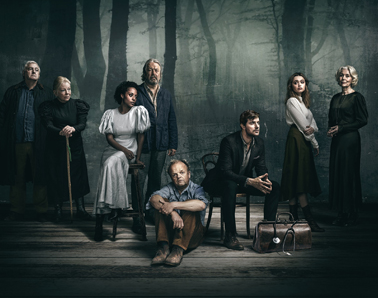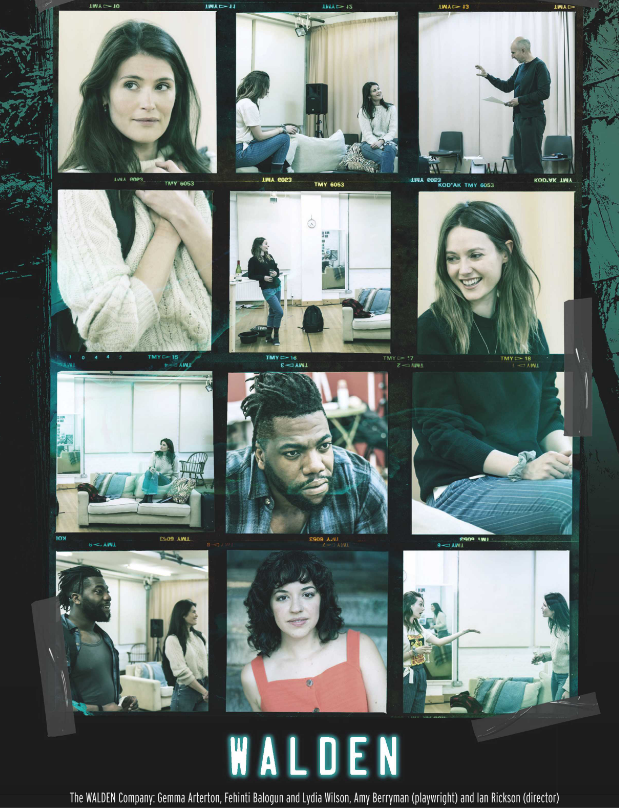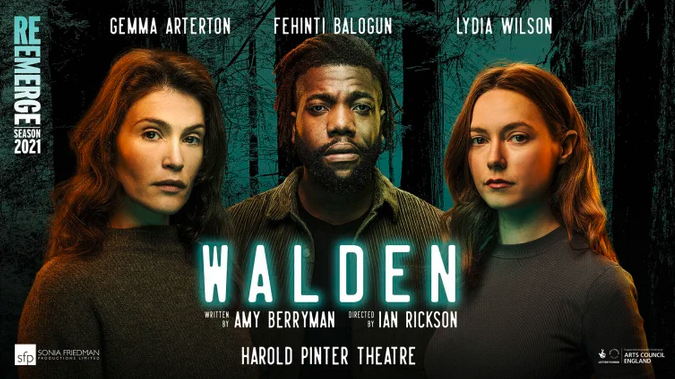The last play to open at the Harold Pinter Theatre before the pandemic arrived was a star-led production of Uncle Vanya, led by Toby Jones in the title role and Richard Armitage as Astrov that also featured Ciarán Hinds as Professor Serebryakov and Sex Education star Aimee Lou Wood as Sonya (pictured below).

It had its run cut short by the pandemic, but in a sign of the resourcefulness that Covid also brought to the industry, the cast resembled at the Pinter Theatre — albeit with Roger Allam replacing Hinds — to create a new filmed version of the production that was broadcast by the BBC, and was the first UK stage show closed by the pandemic to have been transferred instead to the screen, where its abbreviated life on stage can instead now see it live on forever. (Filming, according a release at the time, “took place under strict Covid-19 secure, independently drawn up protocols, with the cast self-isolating and undergoing regular tests and the crew in masks, PPE and socially distancing throughout the process”.)
It was directed by Ian Rickson, who had once run the Royal Court (1998-2006) where he’d presided over new writing premieres by the likes of Conor McPherson and Jen Butterworth (including the former’s The Weir and the latter’s Jersusalem and The River, each of which subsequently transferred to the West End and/or Broadway).
Rickson’s Royal Court production of Chekhov’s The Seagull also transferred to Broadway, so he is equally adept at the classics; and he has since become the director of choice for Sonia Friedman Productions’ revivals of contemporary plays, including Pinter’s Betrayal and Old Times, both also at the Harold Pinter Theatre (and along with The Seagull, all starring Kristin Scott Thomas).
I detail this pedigree by way of a welcome to producer Sonia Friedman and Ian Rickson’s latest collaborative venture, which instead of trotting out another safe revival is instead seeing Rickson preside as artistic director over a three-play season back at the Pinter presented under the umbrella title Re:Emerge, intended (they said when it was announced), to “create a space for vital, new voices and fresh talent in the West End, working alongside some of the industry’s greatest theatremakers and artists, tackling urgent issues integral to rebuilding our society, including structural inequality, climate change and the economics of truth in an internet age.” Just the sort of fare, in fact, that you might expect to encounter at Rickson’s former home of the Royal Court.
It’s certainly one way of blowing the cobwebs off the dusty old West End, and a powerful statement of intent that things could (and should) be different as it returns, even as theatre land is staging a gradual comeback right now, with (most of) the old favourites only scheduled back after the supposed lifting of social distancing on June 21.
It’s even — heaven be praised — a little cheaper than things were before the pandemic, with a top price of £55, and seats in the top balcony at £10. (Well, they have saved a little money on the set: some of Rae Smith’s design is recycled from Uncle Vanya).
But if the West End has faced an existential crisis thanks to the pandemic, American playwright Amy Berryman’s debut play Walden portrays the entire world having one — a giant tsunami has wiped out Sri Lanka, there are over a million dead, and thousands have been displaced. And as earth’s resources dwindle, a point of no return has already been reached for humanity, and NASA is testing ideas for relocating humanity to Mars.

Pics: Johan Persson
Berryman tackles this epic, existential theme by turning it into an intimate domestic drama about twin sisters. One (Lydia Wilson) has just returned from an extended space mission and arrives to visit her sibling (Gemma Arterton), now living in a remote part of the country where, at least, the air can be breathed without wearing a mask, with her boyfriend (Fehinti Balogun). It turns out that their late father was a famous astronaut for NASA, too, and both his daughters had followed him into working for the agency. But Arterton’s character had failed a medical test for suitability to go to space; given, however, the unique genetics she shared with her identical twin, she’s perfect to act as an earth control to observe the long-term effects of outer space on her sister who has gone there.
But Arterton’s boyfriend is an “Earth Advocate”, part of a powerful movement seeking to make the earth more habitable instead of working on more extreme alternatives. Thus the stage is set for a confrontational drama between the three of them on what the future holds and what part they’ll each play in it. Some of this may strain credulity, particularly the conveniently differentiated positions each adopts, as this futuristic ‘disaster movie’ scenario unfolds.
Rickson, however, directing with his customary brooding sense of foreboding and mystery that brought such intensity and strangeness to The Weir and The River, orchestrates his three fine actors in a way that makes it constantly gripping.
It may not be a play able ultimately to sustain its massive themes on such a contained scale, but its so good to be back in a theatre again that’s at least trying to engage with them that I’m both relieved and grateful to have a place to watch it that isn’t Netflix.
- WALDEN runs at the Harold Pinter Theatre to June 12. For further details and to book: https://sfp-reemergeseason.com/home/about-the-season/

